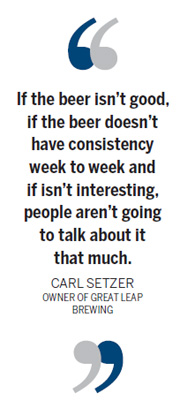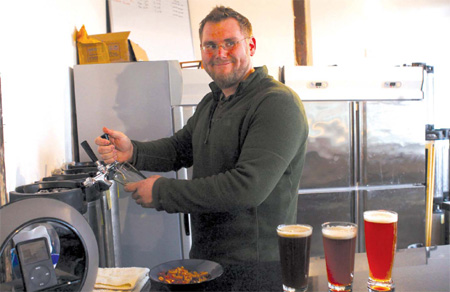Specialty brewers tap into Chinese cities
Updated: 2011-03-25 10:59
By Eric Jou (China Daily European Weekly)
|
Carl Setzer believes microbrews convey the culture and style of his pub and can help him win more customers. Zou Hong / China Daily |
Appreciation of beer creates a niche for those who make dedicated drinks
Discerning beer drinkers in China are slowly but surely tapping into specialty brews, if the experience of a Beijing microbrewer is anything to go by.
The Great Leap Brewing company, owned and operated by American Carl Setzer, 28, started in a converted siheyuan, a traditional Beijing courtyard, in North Luoguxiang, one of Beijing's more trendy areas, just six months ago, producing and selling out about 600 liters a month.
Today, Setzer's microbrewery makes more than 1,800 liters a month - and he sells all of it, some to drinkers at his pub and some to other outlets.
Moreover, his pub, unlike most Beijing pubs, is not open all week - just from Thursdays to Sundays. In fact, he only started to open on Thursdays recently due to the increased demand, Setzer, from Cleveland, Ohio, says.
Initially, most of his customers were expatriates, but the number of local Chinese patronizing his pub is on the increase - thanks to the foreigners telling their local friends, and the locals telling other locals.
"We're seeing an increasing number of locals coming to our pub just to taste our beer," Setzer says.
Indeed, freelance writer David Friesen said the taste for beer in China is slowly changing toward better and stronger brews.
Friesen, a Briton who writes for United-Nations-of-Beer.com, says most local Chinese beers are very similar in taste, with many tasting weak and bland.
"I have probably tried 30 or 40," he says. "While you sometimes get a slightly better lager, or even more rarely a drinkable dark beer such as Tsingtao dark, most of them are still too low in alcohol content, too highly carbonated, lacking in flavor and using cheap ingredients such as rice in place of some of malt."
As such, locals and expatriates who want better tasting beer have to go for the imported brews, some of which can be quite costly, Friesen says.
For example, a pint of a top European beer can cost between 50 and 60 yuan (5.4-6.4 euros) in a pub, with local beers costing between 15-20 yuan. At Setzer's pub, his specialty beers range from 25 to 40 yuan.
Friesen says beers such as those made by Great Leap are still very new in China.
"Microbrews are developed in Europe and North America, but even with their history of beer drinking most people still drink generic branded beers," Friesen says.
"There simply isn't enough of a mainstream demand for craft beer market here yet. It is still limited to a few Chinese beer lovers and expats.
E-paper

Pearl paradise
Dreams of a 'crazy' man turned out to be a real pearler for city
Literary beacon
Venice of china
Up to the mark
Specials

Power of profit
Western companies can learn from management practices of firms in emerging economies

Foreign-friendly skies
About a year ago, 48-year-old Roy Weinberg gave up his job with US Airways, moved to Shanghai and became a captain for China's Spring Airlines.

Plows, tough guys and real men
在这个时代,怎样才"够男人"? On the character "Man"

